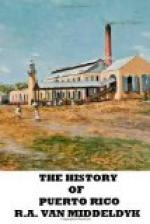The credit for these well-intentioned ordinances undoubtedly belongs to the Dominican friars, who from the earliest days of the conquest had nobly espoused the cause of the Indians and denounced the cruelties committed on them in no measured terms.
Friar Antonia Montesinos, in a sermon preached in la Espanola in 1511, which was attended by Diego Columbus, the crown officers, and all the notabilities, denounced their proceedings with regard to the Indians so vehemently that they left the church deeply offended, and that same day intimated to the bishop the necessity of recantation, else the Order should leave the island. The bishop answered that Montesinos had but expressed the opinion of the whole community; but that, to allay the scandal among the lower class of Spaniards in the island, the father would modify his accusations in the next sermon. When the day arrived the church was crowded, but instead of recantation, the intrepid monk launched out upon fresh animadversion, and ended by saying that he did so in the service not of God only, but of the king.
The officials were furious. Pasamonte, the treasurer, the most heartless destroyer of natives among all the king’s officers, wrote, denouncing the Dominicans as rebels, and sent a Franciscan friar to Spain to support his accusation. The king was much offended, and when Montesinos and the prior of his convent arrived in Madrid to contradict Pasamonte’s statements, they found the doors of the palace closed against them. Nothing daunted and imbued with the true apostolic spirit, they made their way, without asking permission, to the royal presence, and there advocated the cause of the Indians so eloquently that Ferdinand promised to have the matter investigated immediately. A council of theologians and jurists was appointed to study the matter and hear the evidence on both sides; but they were so long in coming to a decision that Montesinos and his prior lost patience and insisted on a resolution, whereupon they decided that the distributions were legal in virtue of the powers granted by the Holy See to the kings of Castilla, and that, if it was a matter of conscience at all, it was one for the king and his councilors, and not for the officials, who simply obeyed orders. The two Dominicans were ordered to return to la Espanola, and by the example of their virtues and mansuetude stimulate those who might be inclined to act wickedly.




